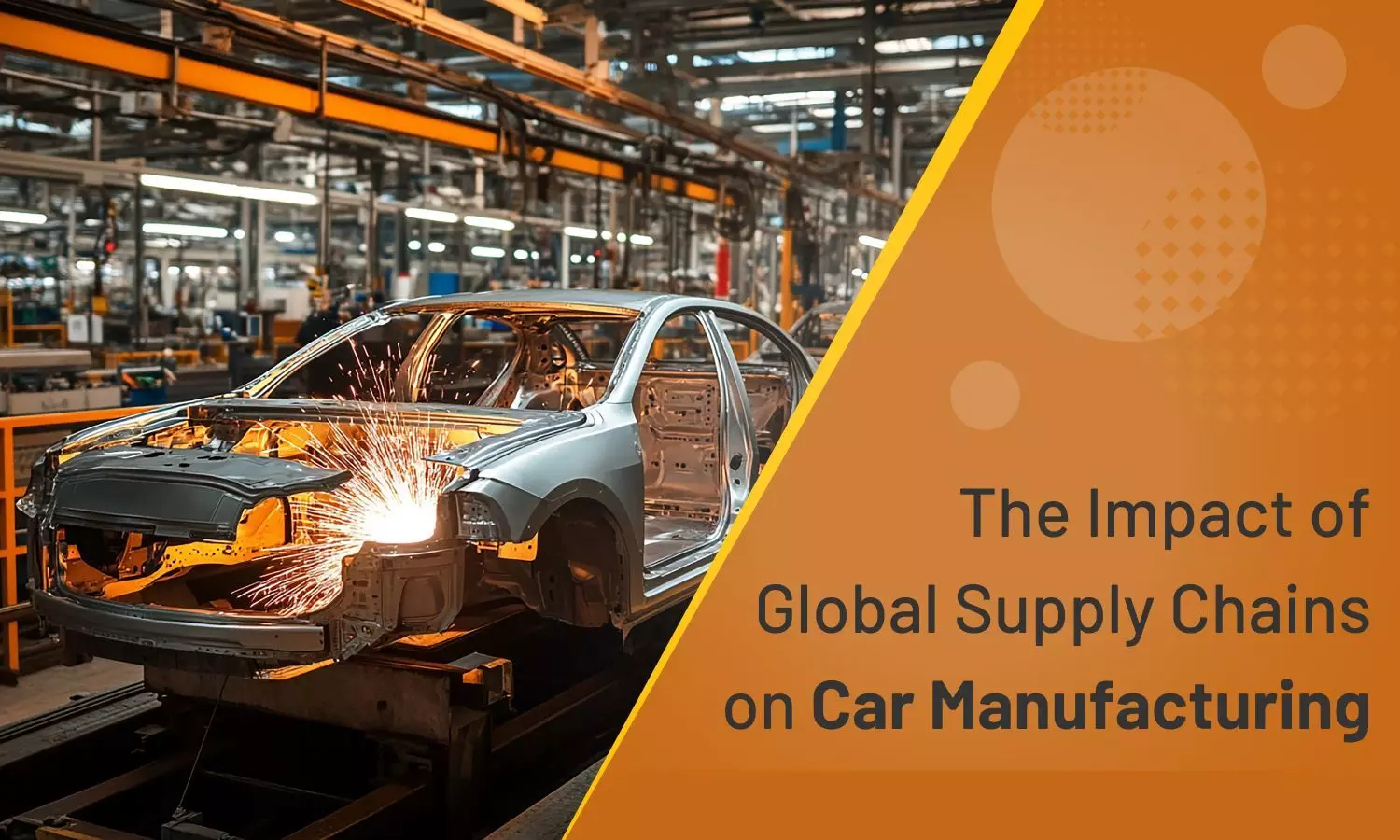The Influence of Global Supply Chains on Automotive Production
Yesterday's supply chain solutions are of no use for mitigating today's automotive challenges. Thus, it is time to rethink how to structure and manage the automotive supply chain issues in today’s modern era.
The Influence of Global Supply Chains on Automotive Production

There is no denying the fact that yesterday's supply chain solutions were ineffective in addressing today's automotive concerns. Thus, it is necessary to reconsider how to build and manage global supply chain issues in automotive production in the modern era.According to Mordor Intelligence, the market size of the automobile industry in India is expected to reach $187.85 billion by 2029, growing at a CAGR of 8.20% during the forecast period (2024-2029). However, the automotive sector exemplifies the pinnacle of modern industrial intricacy and effectiveness.
In fact, in recent decades, the advent of global supply chains has profoundly transformed car production, enabling the creation of vehicles at unprecedented volumes and speeds. However, this shift has introduced its own set of challenges and opportunities. So, let’s delve into how global supply chains have reshaped car manufacturing, highlighting the advantages, potential risks, and the industry's evolving nature.
How Supply Chain Affects Car Industry
Over the last few decades, the landscape of automotive production and supply chain has changed dramatically. Historically, automakers relied on localised supply networks, procuring components and raw materials from nearby areas. However, as the world has changed, firms have expanded their sourcing to international vendors to improve efficiency and save costs.
Here are some advantages. So, let’s look at it:
Cost Efficiency: One of the primary benefits of global supply chains is cost reduction. By sourcing parts from regions with cheaper labor and production costs, manufacturers can achieve significant savings. This has led to reduced vehicle prices for consumers and higher profit margins for manufacturers.
Access to Specialised Parts: Global supply chains enable manufacturers to obtain specialised components and materials not available locally. For instance, high-tech electronic systems or advanced materials can be sourced from specialised global suppliers, improving vehicle performance and quality.
Enhanced Flexibility and Scalability: A global supply chain allows manufacturers to rapidly adjust production levels and respond to fluctuating demand. This agility is essential in an industry where consumer preferences and market conditions can change swiftly.
Innovation and Expertise Exchange: Collaborating with international suppliers fosters innovation and the exchange of knowledge. This is where manufacturers are getting benefits from the global expertise and technological advancements of their suppliers, leading to superior vehicle designs and functionalities.
Challenges in Global Car Manufacturing
Despite the numerous benefits, global supply chains also present several challenges and risks for car manufacturers:
Supply Chain Disruptions: Global supply chains are susceptible to interruptions from geopolitical tensions, natural disasters, and pandemics. The COVID-19 pandemic, for example, underscored the vulnerability of global supply chains as manufacturers experienced shortages of essential components and production delays.
Quality Assurance: Maintaining consistent quality across a broad network of suppliers can be challenging. Variations in supplier standards and practices can lead to quality issues, impacting vehicle reliability.
Logistical Complexity: Managing a global supply chain involves coordinating multiple suppliers, transportation routes, and regulatory requirements. This complexity can result in inefficiencies and higher costs if not effectively managed.
Ethical and Environmental Issues: Sourcing components from various regions raises concerns about labour practices, environmental impact, and sustainability. These issues have become increasingly important to both consumers and regulators.
Supply Chain Optimisation in the Auto Industry: Adapting to the New Reality
To navigate the challenges associated with global supply chains, car manufacturers are adopting several strategies:
Today, businesses are expanding their pool of suppliers to decrease reliance on single sources. This approach helps minimise the impact of disruptions and ensures a more dependable supply of crucial components. Moreover, they are leveraging technological advancements such as blockchain and artificial intelligence to enhance supply chain transparency and efficiency. These tools improve real-time tracking of components, forecasting accuracy, and logistical optimization. Additionally, manufacturers are placing increased emphasis on sustainability within their supply chains. This involves efforts to reduce environmental impacts, ensure ethical labor practices, and develop sustainable materials. Finally, manufacturers are moving production closer to key markets to cut costs. This reshoring or nearshoring strategy reduces dependency on distant suppliers and enhances responsiveness.
Future of Automotive Supply Chains
Looking forward, several trends are likely to shape the future of global supply chains in car manufacturing:
- The move towards electric vehicles (EVs) and new technologies will have an impact on supply chain dynamics. Manufacturers will need to adjust to new components, such as batteries and electric drives, and develop new supply chain strategies to support these innovations.
- Additionally, the ongoing digitalisation of the automotive industry will continue to influence supply chains. Technologies like the Internet of Things (IoT), big data analytics, and automation will play a crucial role in improving supply chain management and operational efficiency.
- Furthermore, the lessons learned from recent disruptions will lead to a focus on creating more resilient and agile supply chains. Manufacturers will invest in strategies to better predict and address disruptions, ensuring stability and continuity in production.
- Finally, as consumer expectations change, manufacturers will need to align their supply chains with demands for greater transparency, sustainability, and ethical practices. Meeting these expectations will be crucial for maintaining brand reputation and competitiveness.
Adaptability: Key to Grow!
Without a doubt, global supply chains have had a huge impact on vehicle manufacture, promoting efficiencies, innovation, and market expansion. However, they present new issues in terms of disruption, quality control, and sustainability. Therefore, as the automotive industry evolves, manufacturers must traverse these complexities while adjusting to new technology, market trends, and consumer demands.

